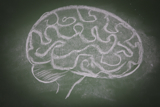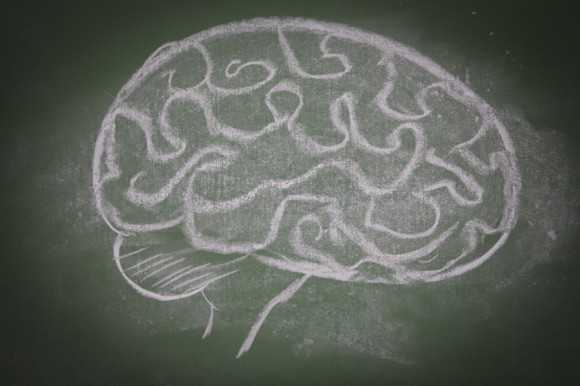Developing Your Kid’s Brain
An interview with Dr. Dan Siegel
Molding of the grey matter! Childhood experiences influence who our children are, and who they grow to be. Dr. Dan Siegel fills us in on how we parents help shape their lives and what exactly is happening in our children’s brain as we do it. Ahem, no pressure! — TMC
How does experience change the physical structure of the brain?
Experience, such as when we talk with one another, listen to a parent, or read an article, activates the neurons in our brain. This activation of the basic cells of the nervous system involves the “firing of neurons,” much like an electrical current that flows through a circuit to turn on a light. When this electrical flow occurs, neurons which are firing together are said to “wire together and survive together.” This means that experience involves the firing of neurons that then strengthens existing connections or creates new ones. This is how experience can change the physical structure of the brain by altering the interconnections that make up the brain’s architecture.
It is this ability to change connections among neurons, the “synaptic linkages” that link one cell to another in a spiderweblike formation, which is the basis for learning. Learning creates the neural firing that strengthens the physical connections among neurons. This all happens by turning on genes in the center of the neuron which then allow proteins to be made and measureable changes in brain structure to occur. Amazing, but true! What we provide as parents in terms of our interactions with our children can directly shape how their brains develop. Genes and the temperamental features they create are also important, naturally. But experience builds on the basic genetically-determined neural structure so that our child’s personality will emerge from a mixture of temperament and experience.
How can parents affect a child’s brain development?
By shaping the experiences children have, parents can shape how a child’s brain develops. From early on in an infant’s life, how parents tune in to the internal mental life of the child can help create a resilient mind and nurture the development of the important regulatory circuits in the child’s brain. This “attunement” simply means that we 1) take in the often non-verbal signals of the child that reveal their inner mental states of feelings and needs; 2) make-sense of those signals; and then 3) respond in a timely and effective way to our child’s communication. The key here is that we respond to more than just behavior—and instead aim our attention at what we can sense is going on inside of our child. This means that we can have “mindsight” for the mental experience and so give a deep sense he or she is seen. I like to use the phrase, “feeling felt” to describe this way in which attuning to a child gives a deep sense of being seen, which gives a child a feeling of being safe and secure.
How we communicate with our children in this way, for example, shapes how they develop the parts of the brain that learn to trust others, to be aware of how they or others feel, and the very circuits in the brain that help regulate emotion. Studies now reveal how what we do as parents even shapes the parts of the genetic machinery that help regulate “gene expression” or how genes get activated to allow the brain to grow well. Attuned communication—being sensitive to your child and making a reconnection when inevitable ruptures in that connection occur throughout parenting—is the best way to offer the relational experiences that help a child thrive and his or her brain to grow well! Don’t fret over missed moments of connection or of tense moments of misunderstanding—use these to make a move to reconnect and repair such unavoidable ruptures.
Can you tell us about how frequently hearing “yes” vs. “no” in childhood can alter brain development? How does that play out behaviorally?
Children need to feel seen and understood which ultimately gives them an important feeling of being connected in the world. After the age of one year, children begin to hear “no” from their parents once they are able to move around the floor on their own and walk into all sorts of potential dangers. Even with “no” being heard, it is possible to give the necessary sense of structure to a child by focusing in a “yes” way as you attune to their inner experience, and not just limiting their outward behavior. “I see you are excited that grandma is coming over, but throwing the ball at the window is not okay ‘cause the window could break. Let’s take all that energy you have inside and play ball where it is safe and release some of that great excitement you have before Grandma gets here.” This is a “yes” way of creating structure that teaches a child to understand his or her own inner world. Discipline means teaching, not punishment. Just saying “NO! don’t throw that ball at the window…go to your room NOW!” is a “no” way of reacting that misses the chance to use this moment as a teaching opportunity. Creating structure with a “yes way of parenting” takes just a bit of practice and perhaps a few seconds more of time, but this intention to teach and attune is worth the effort to make into a reality.
When, if ever, are brains finished growing? How can parents continue to expand their own?
The shaping of our brains and who we are by experience not only happens in childhood, it occurs throughout our lifetime. So the experiences YOU have as a parent continue to shape the connections in your own brain. Lifelong learning is what we now know about the brain’s changes across the lifespan. The openness we bring as parents to making even the most challenging parenting moments into learning opportunities can make the difference between seeing them as burdens or moments of further development in our lives. Let everything you experience, even or especially these challenging moments, become an opportunity for deeper learning, and making your own brain stronger!
We can actually turn to the studies of attachment—the relationship between a child and a caregiver—to see how parents can use their parenting experience to continue growing. In fact, the best predictor of your child’s attachment is how you have come to make sense of how your own early childhood experience has affected your development. The great news of this scientific finding is that you can learn—at any age—to make sense of your life and bring the basic elements of secure attachment to your children. It is a win-win-win situation, since your child will do better, you will feel a deeper sense of well-being in your own life, and you will have stopped the passage of non-ideal parenting across the generations even for your grandchildren! The important take home point is that no matter what happened to you in your own youth, if you make sense of those experiences, you and your offspring can thrive.
Since learning and brain growth are lifelong parts of being human, we can support each other in this important way of being open to further growth. Becoming a parent is challenging and an opportunity to continue to develop and learn about yourselves and others! Enjoy!
Dr. Dan Siegel (drdansiegel.com) is currently a clinical professor of psychiatry at the UCLA School of Medicine where he is also on the faculty of the Center for Culture, Brain, and Development and the Co-Director of the Mindful Awareness Research Center at UCLA. Dr. Siegel is also the Executive Director of the Mindsight Institute, an educational organization that focuses on how the development of mindsight in individuals, families and communities can be enhanced by examining the interface of human relationships and basic biological processes.
The Mother Company aims to support parents and their children, providing thought-provoking web content and products based in social and emotional learning for children ages 3-6. Check out the first episode of our DVD series, “Ruby’s Studio: The Feelings Show”, which teaches kids about how to express their feelings. We want to be a parenting tool for you!
Posted in: Uncategorized
